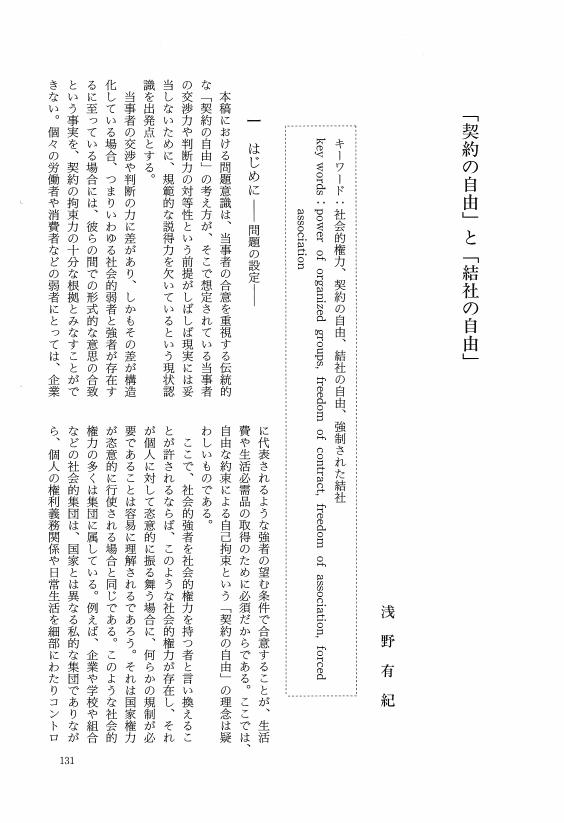2 0 0 0 OA イデオロギー論と法存在論—マイホーファーの見解について—
- 著者
- 松岡 誠
- 出版者
- 日本法哲学会
- 雑誌
- 法哲学年報 (ISSN:03872890)
- 巻号頁・発行日
- vol.1988, pp.95-103, 1989-10-30 (Released:2008-11-17)
- 参考文献数
- 24
2 0 0 0 OA 憲法学はなぜリバタリアニズムをシリアスに受け止めないのか?
- 著者
- 愛敬 浩二
- 出版者
- 日本法哲学会
- 雑誌
- 法哲学年報 (ISSN:03872890)
- 巻号頁・発行日
- vol.2004, pp.76-87,203, 2005-09-30 (Released:2008-11-17)
- 参考文献数
- 33
Libertarianism is not so popular among the constitutional lawyers in Japan. There are some reasons for that situation, but one of the most important reasons is that Japanese Constitution is, both in content and in its historical background, not suitable for the ideology of libertarianism. So under the constitution like that, libertarianism could hardly prevail, and there is no need for constitutional lawyers to take it seriously. But this story is too simple. If libertarianism is not the vindication of “laissez-faire” capitalism, but the diehard claim for liberty of private life of individuals, then constitutional lawyers should not make light of the critical stance of libertarians to the paternalistic regulation of the government. Especially in Japan, constitutional theory of “double standard dependent on the aim of regulation” allows the government very wide range of paternalistic regulation on economic freedom. Japanese constitutional lawyers could learn much from the libertarian criticism of that theory. But the problem of libertarian criticism is that they don't pay due attention to democracy. So taking libertarianism more seriously, we, Japanese constitutional lawyers, should come to think much about democracy, and I think it's good for us.
2 0 0 0 OA 事実認定の論理に関する一考察
- 著者
- 小林 公
- 出版者
- 日本法哲学会
- 雑誌
- 法哲学年報 (ISSN:03872890)
- 巻号頁・発行日
- vol.1974, pp.103-135, 1975-10-30 (Released:2008-11-17)
- 参考文献数
- 54
2 0 0 0 OA 法・規律権力・抵抗—M・フーコーから法と権力を考える—
- 著者
- 関 良徳
- 出版者
- 日本法哲学会
- 雑誌
- 法哲学年報 (ISSN:03872890)
- 巻号頁・発行日
- vol.2000, pp.155-163, 2001-10-30 (Released:2008-11-17)
- 参考文献数
- 6
2 0 0 0 自然法思想におけるモラル・センスの位置付け
- 著者
- 中村 隆文
- 出版者
- 日本法哲学会
- 雑誌
- 法哲学年報 (ISSN:03872890)
- 巻号頁・発行日
- vol.2006, pp.229-242,258, 2007
Locke's theory as a contractarian has a great influence on the debates about social justice between “liberalism” and “libertarianism” yet. Even have many differences of opinions in those, they almost depend on the “natural law” and “natural right” elaborated by Locke when he tried to defend the “liberty” against an authority of the king. This reason is that they believe Locke's natural jurisprudence and ideas of “liberty” and “right” are set in the Declaration of Independence. It's nothing to be surprised at this, so now I intend not to doubt this fact, and that, not to convict their debates as pointless.<br> I suggest that “liberty”, “right” and “justice” can be also defended philosophically by a school of thought in the eighteenth century other than Locke's, no matter how we estimate his influence on the then America. Directly and frankly professing, I regard the Scottish Enlightenment as functioning that role in the century, and its significance has still lived under the debate about the idea of social justice.<br> I place a special emphasis on the point that Scottish thinkers, especially David Hume and Adam Smith, had defended the America outside the theory of contractarianism involved with liberalism and Libertarianism. It shows that “justice” intrinsically exists in a relationship, in other words “convention” and it can not be discovered in the contractual lawmaking way but in the judiciary way reflecting sense of justice, or moral sense, because law of justice will be expanding over the domain of human rationality of economical worldview.
2 0 0 0 OA マルクス主義法理論の批判的再構成
- 著者
- 山口 廸彦
- 出版者
- 日本法哲学会
- 雑誌
- 法哲学年報 (ISSN:03872890)
- 巻号頁・発行日
- vol.1972, pp.204-218, 1973-10-30 (Released:2008-11-17)
- 参考文献数
- 53
2 0 0 0 OA 宗教と法をめぐる法文化比較 天皇制とオウム真理教を手がかりに
- 著者
- 角田 猛之
- 出版者
- 日本法哲学会
- 雑誌
- 法哲学年報 (ISSN:03872890)
- 巻号頁・発行日
- vol.2002, pp.59-70, 2003-10-20 (Released:2008-11-17)
- 参考文献数
- 9
2 0 0 0 OA 不確実な社会における「政治的なもの」の構想—審議的民主主義とリスク社会論—
- 著者
- 毛利 康俊
- 出版者
- 日本法哲学会
- 雑誌
- 法哲学年報 (ISSN:03872890)
- 巻号頁・発行日
- vol.2000, pp.124-132, 2001-10-30 (Released:2008-11-17)
- 参考文献数
- 7
2 0 0 0 OA ガダマーの哲学的解釈学と現代ドイツの法哲学
- 著者
- 竹下 賢
- 出版者
- 日本法哲学会
- 雑誌
- 法哲学年報 (ISSN:03872890)
- 巻号頁・発行日
- vol.1997, pp.125-138, 1998-10-30 (Released:2009-02-12)
- 参考文献数
- 24
2 0 0 0 OA 現代ドイツにおける宗教と法
- 著者
- 初宿 正典
- 出版者
- 日本法哲学会
- 雑誌
- 法哲学年報 (ISSN:03872890)
- 巻号頁・発行日
- vol.2002, pp.86-97, 2003-10-20 (Released:2008-11-17)
- 参考文献数
- 11
2 0 0 0 OA 山田・乎野・亀本報告へのコメント実定法学の立場から
- 著者
- 道垣内 弘人
- 出版者
- 日本法哲学会
- 雑誌
- 法哲学年報 (ISSN:03872890)
- 巻号頁・発行日
- vol.2006, pp.128-133,263, 2007-10-30 (Released:2010-12-16)
What are the characteristics of legal thinking is a fundamental but difficult problem to answer in legal sciences, including philosophy of law, even if we focus on the way of the interpretation of statutory laws. However, at least, we might say that to keep the consistency of law is one of the most important requirements in the interpretation. What to evade is not only the apparent contradiction in the interpretation but the hidden conflict of different principles, for example, liberalism, libertarianism, paternalism and so on, when we cannot justify the coexistence of principles by the difference of situations. In this context, philosophy of law works as a supplier of tools for analyzing the hidden principles behind legislation, cases and statutory interpretation by academics. The education of philosophy of law as a tools-supplier might have three stages. 1) To teach the principles themselves (e. g. justice theories). 2) To teach the way of analysis. 3) To discuss the relative merits of principles. However, too much emphasis of the importance of philosophy of law sometimes drive the students to settle the cases on the principle which they believe in, without paying attention to the possibility of making other contradiction in the whole system of law. Legal thinking is a restrictive one in the sense that they should respect the firmly established rules.
2 0 0 0 OA メタ倫理学的自然主義再考 価値論と人間科学
- 著者
- 内藤 淳
- 出版者
- 日本法哲学会
- 雑誌
- 法哲学年報 (ISSN:03872890)
- 巻号頁・発行日
- vol.2005, pp.135-143,195, 2006-10-30 (Released:2010-02-15)
- 参考文献数
- 5
Normative judgments and their criteria are generally excluded as subjects of science on account of the dualism of facts and values. Meta-ethical naturalism, which attempts to present criteria for values in terms of facts, is therefore regarded as a fallacy. However, as normative judgments are produced through the workings of the mind of each individual, we may find some clues for examining the foundations or criteria of our normative judgments by analyzing the process of the working of our minds by scientific methods and thereby discovering its basic rules. This means that ethical problems can be approached and solved in the field of human science. Indeed, we can find some useful scientific knowledge related to meta-ethical problems. For example, it has been demonstrated in some studies of cognitive psychology that judgments on moral values are decided by intuition, which is an emotional reaction, rather than by rational thinking. And according to recent research in evolutionary psychology, emotions function in order to gain benefits for each person in their reciprocal relationships with others. These scientific studies suggest that the ultimate foundation of normative judgments is in human intuition as an emotional reaction and the ultimate criterion of “good/bad” or “right/wrong” is whether it is beneficial to the individual in his/her reciprocal relationships with others. While there remains much scope for further verification, these studies suggest that it is possible to examine meta-ethical problems by scientific methods and support meta-ethical naturalism, which presents the foundations and criteria for normative values through factual statements.
2 0 0 0 OA 権威と原意—ジョセフ・ラズの解釈論と原意主義
- 著者
- 丸 祐一
- 出版者
- 日本法哲学会
- 雑誌
- 法哲学年報 (ISSN:03872890)
- 巻号頁・発行日
- vol.2002, pp.183-192, 2003-10-20 (Released:2008-11-17)
- 参考文献数
- 43
- 著者
- 瀬戸山 晃一
- 出版者
- 日本法哲学会
- 雑誌
- 法哲学年報 (ISSN:03872890)
- 巻号頁・発行日
- vol.2002, pp.131-140, 2003-10-20 (Released:2008-11-17)
- 参考文献数
- 15
2 0 0 0 OA 宗教と法-聖と俗の比較法文化-非西欧のパースペクティヴから
- 著者
- 千葉 正士
- 出版者
- 日本法哲学会
- 雑誌
- 法哲学年報 (ISSN:03872890)
- 巻号頁・発行日
- vol.2002, pp.29-43, 2003-10-20 (Released:2008-11-17)
- 参考文献数
- 29
2 0 0 0 OA 宗教と法-キリスト教のパースペクティブから
- 著者
- ホセ・ヨンパルト
- 出版者
- 日本法哲学会
- 雑誌
- 法哲学年報 (ISSN:03872890)
- 巻号頁・発行日
- vol.2002, pp.8-20, 2003-10-20 (Released:2008-11-17)
- 参考文献数
- 1
2 0 0 0 OA 「契約の自由」と「結社の自由」
- 著者
- 浅野 有紀
- 出版者
- 日本法哲学会
- 雑誌
- 法哲学年報 (ISSN:03872890)
- 巻号頁・発行日
- vol.2001, pp.131-138, 2002-10-30 (Released:2008-11-17)
- 参考文献数
- 10
2 0 0 0 OA 情報化社会における内部告発と法—原発事故、医療過誤を例に—
- 著者
- 青野 透
- 出版者
- 日本法哲学会
- 雑誌
- 法哲学年報 (ISSN:03872890)
- 巻号頁・発行日
- vol.2001, pp.102-106, 2002-10-30 (Released:2008-11-17)
- 参考文献数
- 16
2 0 0 0 OA 高度情報社会と政治・公共性の変容
- 著者
- 服部 高宏
- 出版者
- 日本法哲学会
- 雑誌
- 法哲学年報 (ISSN:03872890)
- 巻号頁・発行日
- vol.2001, pp.63-75, 2002-10-30 (Released:2008-11-17)
- 参考文献数
- 9
2 0 0 0 OA ネツトワークと重層化するコミユニテイ
- 著者
- 大屋 雄裕
- 出版者
- 日本法哲学会
- 雑誌
- 法哲学年報 (ISSN:03872890)
- 巻号頁・発行日
- vol.2001, pp.76-91, 2002-10-30 (Released:2008-11-17)
- 参考文献数
- 32















